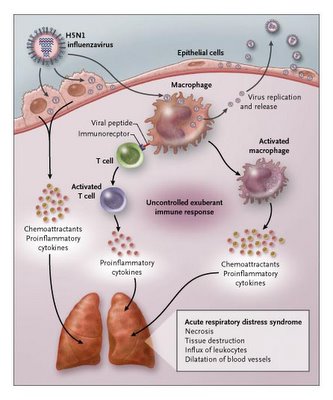No Mechanical Ventilators

The best preparedness I know of as an M.D. is found in the Gopher State!
From the Center for Infectious Disease Research & Policy
Academic Health Center -- University of Minnesota
Academic Health Center -- University of Minnesota
Dr. Osterholm states that we have great shortages like for example, in the United States today, we have only 105,000 mechanical ventilators, 75,000 to 80,000 of which are in use at any given time for everyday medical care; during a garden-variety influenza season, more than 100,000 are required. In a pandemic, most patients with influenza who needed ventilation would not have access to it when Acute Respiratory Distress Syndrome which results from Influenza.

- Interactive Figure. Proposed Mechanism of the Cytokine Storm Evoked by Influenzavirus
Julie Gerberding, MD, director of the Centers for Disease Control and Prevention (CDC), described the threat posed by the H5N1 avian flu virus, now widespread in Asia. The virus has infected 138 people and killed 71 but has not found a way to spread easily from person to person. The virus's acquisition of that ability would probably bring a pandemic.
If that event happens in a relatively isolated rural area, Gerberding said, "There is a good chance that we could quench it." But if it happens in an urban area, containment won't be possible, she predicted.
Vaccine and antiviral supplies
Gerberding sketched HHS's preparations involving vaccines and antiviral drugs. The goal is to amass enough of the prototype H5N1 vaccine to protect 20 million peoplea tall order, given that it takes a much bigger dose of this vaccine than of ordinary flu vaccine to provide protection.
Gerberding sketched HHS's preparations involving vaccines and antiviral drugs. The goal is to amass enough of the prototype H5N1 vaccine to protect 20 million peoplea tall order, given that it takes a much bigger dose of this vaccine than of ordinary flu vaccine to provide protection.
HHS hopes to acquire 81 million treatment courses of antiviral drugs, mainly Tamiflu (oseltamivir), but has only about 4.3 million courses on hand now, Gerberding said.
Later, Leavitt cautioned people not to pin too much hope on antivirals. "People have begun to equate preparedness with antivirals, and that's a misnomer," he said. "It's not a certainty that Tamiflu or any antiviral will be a cure or be the key to prevention. . . . It'll shorten the symptoms, but it's not a solution."
Minnesota's pandemic plan
Minnesota Health Commissioner Dianne Mandernach said Minnesota was one of the first states to develop a pandemic plan, starting in 1999. She outlined a variety of measures under way or envisioned in the plan:
Minnesota Health Commissioner Dianne Mandernach said Minnesota was one of the first states to develop a pandemic plan, starting in 1999. She outlined a variety of measures under way or envisioned in the plan:
- For surveillance, the state has 27 hospitals and clinics that routinely report flu cases to the Minnesota Department of Health (MDH), which is closely linked to the CDC, she said.
- The state legislature recently clarified state laws on isolation and quarantine.
- The MDH is working with local agencies around the state to make sure that people who would be isolated or quarantined in a pandemic would have access to essential services.
- The state would close or cancel public venues and events if necessary, including even church services. "We would discontinue church services, and that would be very, very difficult for many people," Mandernach said.
- The MDH has a program to provide health information to the roughly 11% of Minnesotans who don't understand or speak English. Called Emergency and Community Health Outreach (ECHO), the program provides messages in six languages.
- The state is tracking hospital resources and considering options for setting up and staffing overflow facilities.
- Last week state officials practiced how they would distribute a shipment of medical supplies from the Strategic National Stockpile, a task that requires multiple approaches.
One concern is a shortage of mechanical ventilators. "We do not have and will not have enough ventilators in Minnesota," Mandernach said. "So it's really going to be a matter of planning for and maximizing the use of resources."
She also called for individuals to prepare for a pandemic by taking steps such as stockpiling some water and food. "A two-way radio should be on our Christmas list this year," she said.
In conclusion, Mandernach said, "We are in a marathon, and there is no finish line. The day that we think we're prepared is the day that we've lost the race."
Dominus Vobiscum...




0 Comments:
Post a Comment
<< Home